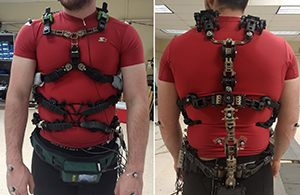
Contact Us
Institutional Communications
Bureau of Mines Building, Room 137
Laramie, WY 82071
Phone: (307) 766-2929
Email: cbaldwin@uwyo.edu
UW Assistant Professor Paves the Way for Back Pain Relief with Intelligent Trunk Exoskeletons
Published September 03, 2019

The original exoskeleton device pictured here was developed by Livity Technologies.
UW Assistant Professor Domen Novak’s team will use a three-year grant from the National
Science Foundation to obtain fundamental knowledge about the effects a trunk exoskeleton
has on human movement and physiology in a variety of dynamic activities. (Domen Novak
Photo)
Assistant Professor Domen Novak in the University of Wyoming’s Department of Electrical and Computer Engineering recently received a grant of more than $520,000 from the National Science Foundation for research on trunk exoskeletons that can prevent and relieve back pain.
As principal investigator, Novak will introduce intelligent and adaptive components to an exoskeleton prototype originally created by Colorado startup company Livity Technologies. The original model limited the wearer’s ability to perform dynamic functions with the stabilization needed for effective support or flexibility. The research objective is to promote useful and comfortable interactions between the device and its wearer.
Novak is joined by Boyi Dai, an associate professor in UW’s Division of Kinesiology and Health Promotion, as co-principal investigator.
In early research funded through Wyoming’s National Institutes of Health IDeA Networks of Biomedical Research Excellence (INBRE) program, Novak, Dai and students conducted research on 12 healthy participants ranging from 18 to 65 years old. They found that the exoskeleton was not providing consistent support in response to various movements the participants were performing such as sitting, standing and lifting.
Once the grant officially begins Jan. 1, 2020, Novak and his team will carry out three “work packages” over the course of the three-year grant. The project will obtain fundamental knowledge about the effects a trunk exoskeleton has on human movement and physiology in a variety of dynamic activities. The team currently has two exoskeleton devices and potentially will build up to five more designed for various body heights.
Anonymous research participants will be recruited through local physical therapy offices and other means. UW’s Institutional Review Board will oversee the process to ensure that all procedures are ethically acceptable. Livity Technologies will continue collaboration with Novak’s team throughout the grant to provide exoskeleton maintenance and mechanical development.
Incorporating smart technology into the device is a key component in the advancement of biomedical research, according to Novak. Using motors and machine-learning algorithms, the exoskeleton could adapt itself to specific wearers and activities, providing personalized support. Practical use in occupations where heavy lifting is present and broad impact on back pain prevention are key objectives in the research.
Additionally, Novak believes this project will promote advances in nonsurgical and nonpharmaceutical interventions that may be more effective than products available today.
“Lower back pain is a health issue we can all relate to,” Novak says. “We hope this research project will lead to low-cost, smart solutions that can relieve and prevent back pain for millions of people all over the world.”
Novak holds a diploma and a Ph.D. in electrical engineering from the University of Ljubljana in Slovenia. His main research area is human-robot interaction, particularly rehabilitation robotics. He is interested in the information that robots can obtain about humans’ performance, intentions and emotional states via sensors such as heart rate, electromyography, electroencephalography and eye tracking.
He also is interested in how robots can motivate humans to exercise using interesting virtual environments and other types of feedback. To achieve his goals in this area, he makes use of expertise in robotics, biomedical signal processing, sensor fusion and virtual reality.
Contact Us
Institutional Communications
Bureau of Mines Building, Room 137
Laramie, WY 82071
Phone: (307) 766-2929
Email: cbaldwin@uwyo.edu
